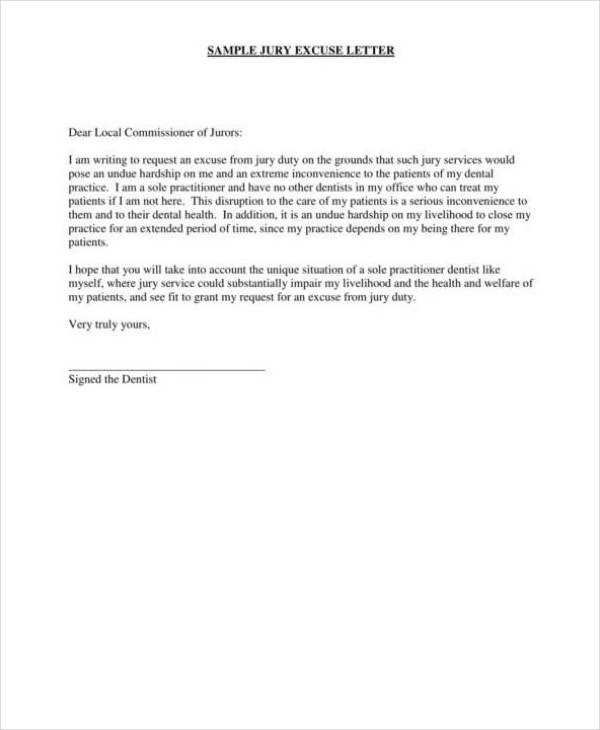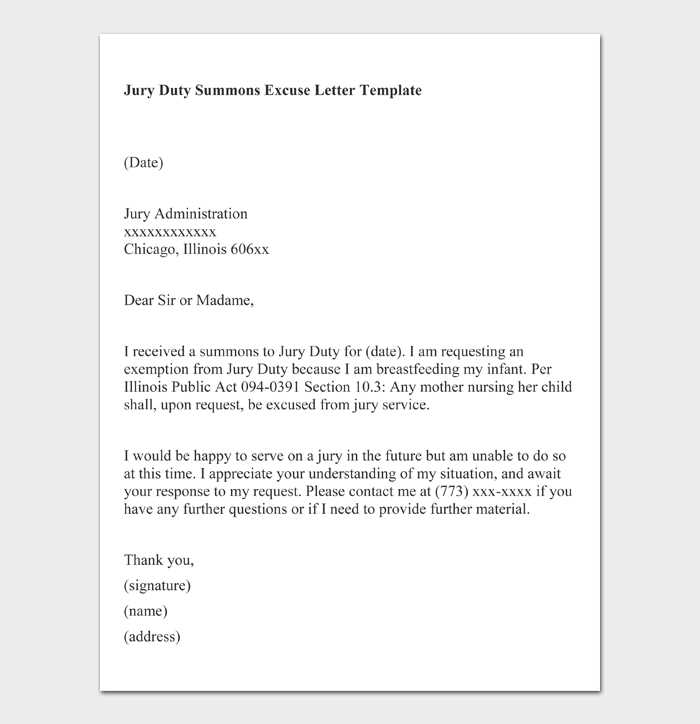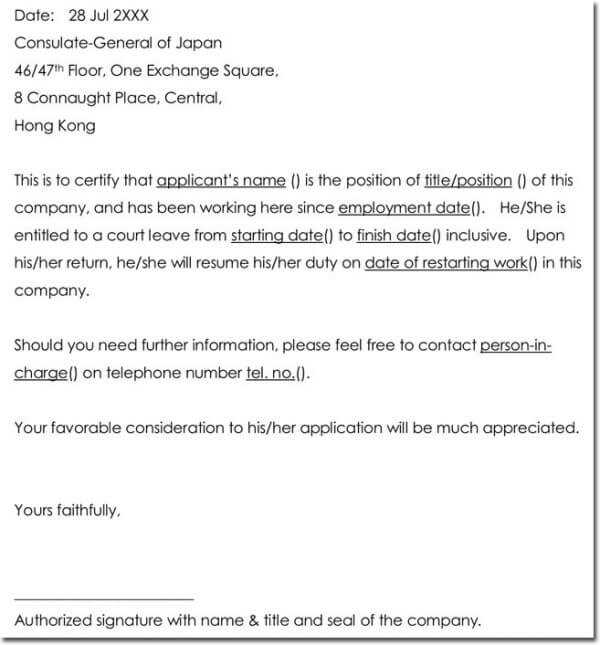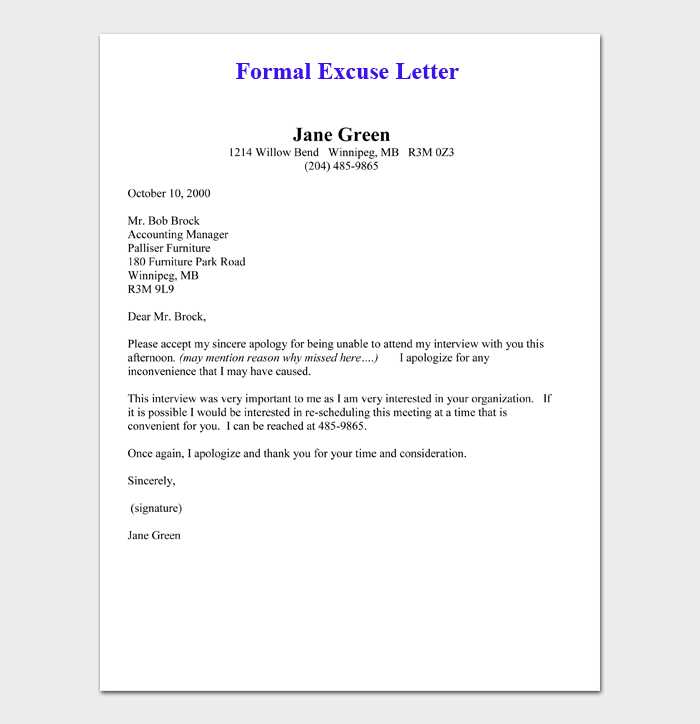Excuse from Jury Duty Letter Template

When you’re called to participate in a legal proceeding, there are certain circumstances that may prevent you from fulfilling this obligation. In such cases, you can formally request to be excused based on specific reasons. This process involves drafting a written request to present your situation and provide valid justification for your exemption.
Understanding the components of a proper request is crucial to ensure that your appeal is taken seriously. The right approach can make a significant difference in the approval of your request, saving you time and stress. This guide will help you craft a strong and convincing appeal by outlining the necessary steps and offering practical examples to guide you through the process.
How to Request Jury Duty Exemption
When you are summoned for a legal obligation that you are unable to fulfill, it’s important to know how to properly request to be excused. The process usually requires submitting a formal appeal where you present a valid reason for not being able to participate. This allows you to inform the authorities of your situation and seek approval for an exemption.
To initiate the process, you must first gather any relevant documentation that supports your claim. Whether it’s health-related, work-related, or due to personal circumstances, providing clear and accurate information will strengthen your case. After drafting your request, ensure it is submitted within the appropriate time frame to allow the reviewing authority ample time to process your appeal.
Writing an Effective Appeal Request
Creating a compelling appeal involves clearly outlining your reason for requesting to be excused from a legal commitment. A well-structured document ensures that your case is understood and considered in a timely manner. The key to success is providing enough details to justify your need to be relieved from the obligation while maintaining professionalism and clarity.
Start by including your personal information, followed by a detailed explanation of your situation. Be honest and provide any supporting documentation if necessary. It’s also essential to express your willingness to comply with any further requirements or instructions, should the need arise. Below is an example structure to help you organize your request:
| Section | Description |
|---|---|
| Introduction | State your full name, case number, and reason for writing. |
| Explanation | Detail the reason for your inability to participate, including relevant facts and dates. |
| Supporting Documents | Mention any documents you are attaching to support your request, such as medical notes or work schedules. |
| Closing | Express gratitude for considering your request and provide contact information for follow-up. |
Valid Reasons to Be Excused from Jury Duty
There are several legitimate circumstances that may prevent individuals from fulfilling their obligation to participate in a legal proceeding. These reasons vary depending on personal, medical, or professional situations, and it’s important to understand what qualifies as a valid basis for exemption. Recognizing these reasons can help ensure your request is appropriately considered and approved.
Common justifications include serious health issues that require immediate attention or long-term care, caregiving responsibilities for dependents, or financial hardships due to being unable to take time off work. Additionally, if an individual has already served in a legal proceeding recently, they may also be eligible for a deferral. It’s essential to provide any necessary documentation to support these claims when submitting your request.
Essential Components of an Excuse Request

When submitting a request to be relieved from a legal responsibility, it’s important to include specific information to ensure the process is smooth and efficient. A properly structured request will increase the likelihood of it being approved. Below are the key elements to include when drafting your appeal.
Key Information to Include
- Personal Details: Include your full name, address, and any identifying numbers like case or reference numbers.
- Reason for Request: Clearly explain why you are unable to fulfill the obligation. Be specific and provide relevant details.
- Supporting Documents: Attach any necessary documentation that strengthens your case, such as medical certificates or work schedules.
- Contact Information: Provide your phone number or email address for follow-up communication.
Important Considerations
- Timely Submission: Ensure your request is submitted within the specified time frame to allow for processing.
- Professional Tone: Keep the tone formal and respectful, as this increases the chance of a positive outcome.
- Clear Explanation: Be concise and clear in your explanation. Avoid unnecessary details that do not directly support your request.
Examples of Legal Obligation Exemption Requests
Providing clear and structured examples can help you understand how to frame your own appeal when seeking relief from a legal obligation. Below are sample requests tailored to different circumstances. These examples demonstrate the tone and format that can be applied when submitting your appeal.
Example 1: Medical Condition
Dear [Recipient’s Name],
I am writing to formally request to be excused from the upcoming legal proceeding. Unfortunately, I am currently dealing with [medical condition], which requires ongoing treatment and rest. I have attached a letter from my physician, Dr. [Name], who can confirm my condition and the need for medical care during this period. I appreciate your understanding and consideration in this matter.
Sincerely,
[Your Full Name]
Example 2: Family Caregiver Responsibilities

Dear [Recipient’s Name],
I hope this letter finds you well. Due to my responsibilities as the primary caregiver for my [family member], I am unable to attend the legal proceedings scheduled for [dates]. [Family member’s name] requires continuous care and I am unable to make alternative arrangements during this time. I have enclosed supporting documents that verify my caregiving responsibilities. Thank you for your time and attention to this request.
Sincerely,
[Your Full Name]
Steps to Submit Your Exemption Request

Submitting your request to be relieved from a legal obligation involves a few simple but important steps. Ensuring that you follow the correct procedure will help your appeal be processed quickly and efficiently. Below are the key actions to take when preparing and submitting your request.
- Review Eligibility Criteria: Before submitting, ensure that your reason qualifies under the conditions set by the court or relevant authority.
- Prepare Supporting Documentation: Gather any necessary documents, such as medical certificates, work schedules, or proof of family responsibilities, that strengthen your case.
- Write Your Appeal: Compose a clear and concise explanation of why you are unable to fulfill the obligation. Ensure that your request is polite and professional.
- Submit the Request: Follow the instructions provided by the court or agency on how to submit the request, whether online, by mail, or in person.
- Wait for Confirmation: Once submitted, await a response to confirm whether your request has been accepted or denied. Keep track of any deadlines for follow-up.
By following these steps, you can ensure that your request is submitted correctly and is more likely to be processed without issues.
What to Expect After Submitting the Request
Once your request to be exempted from a legal obligation has been submitted, there are several things you can expect during the review and decision-making process. The authorities will assess your appeal based on the information provided and the circumstances of your case. Here’s an overview of the steps that typically follow.
1. Acknowledgement of Submission
After submitting your appeal, you will likely receive an acknowledgment confirming that your request has been received. This could come in the form of an email, letter, or a notification through an online portal. Make sure to keep this confirmation for your records.
2. Review Process
The relevant authorities will carefully review your submission to determine if it meets the necessary criteria for exemption. This process may take a few days or weeks depending on the volume of requests and the complexity of your situation. It is important to be patient during this time and wait for further instructions.
3. Decision Notification
Once your request has been reviewed, you will be informed of the decision. If your appeal is accepted, you will be relieved from the obligation as requested. If denied, you may be given instructions on how to proceed, which could include the option to appeal further or comply with the requirement.
Tip: Stay proactive and keep track of any additional documents or actions that may be required during the process. Respond promptly to any requests for further information or clarification.